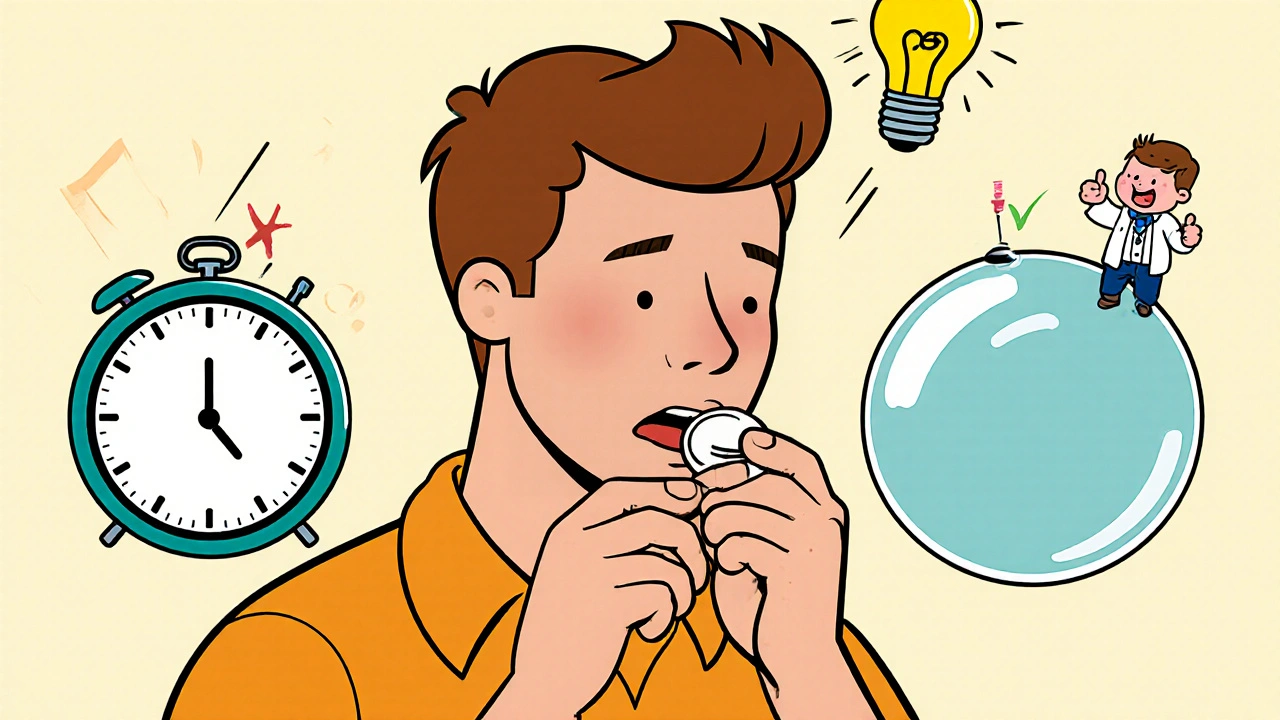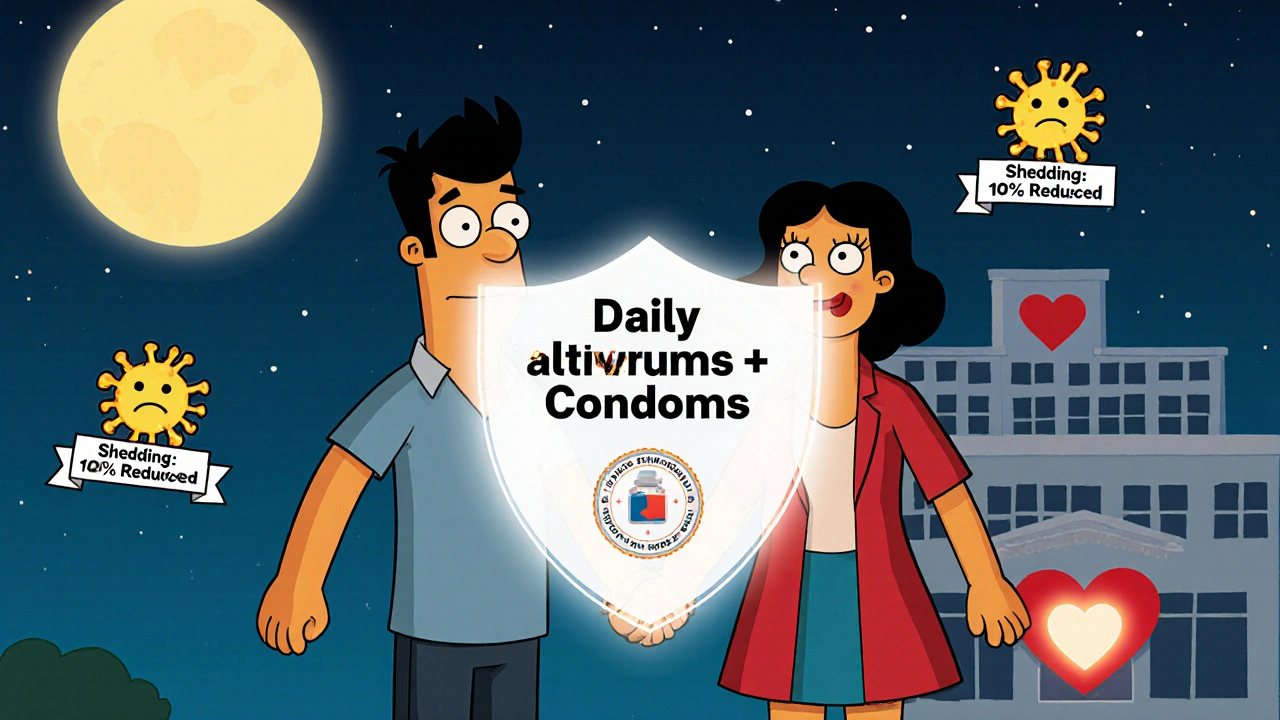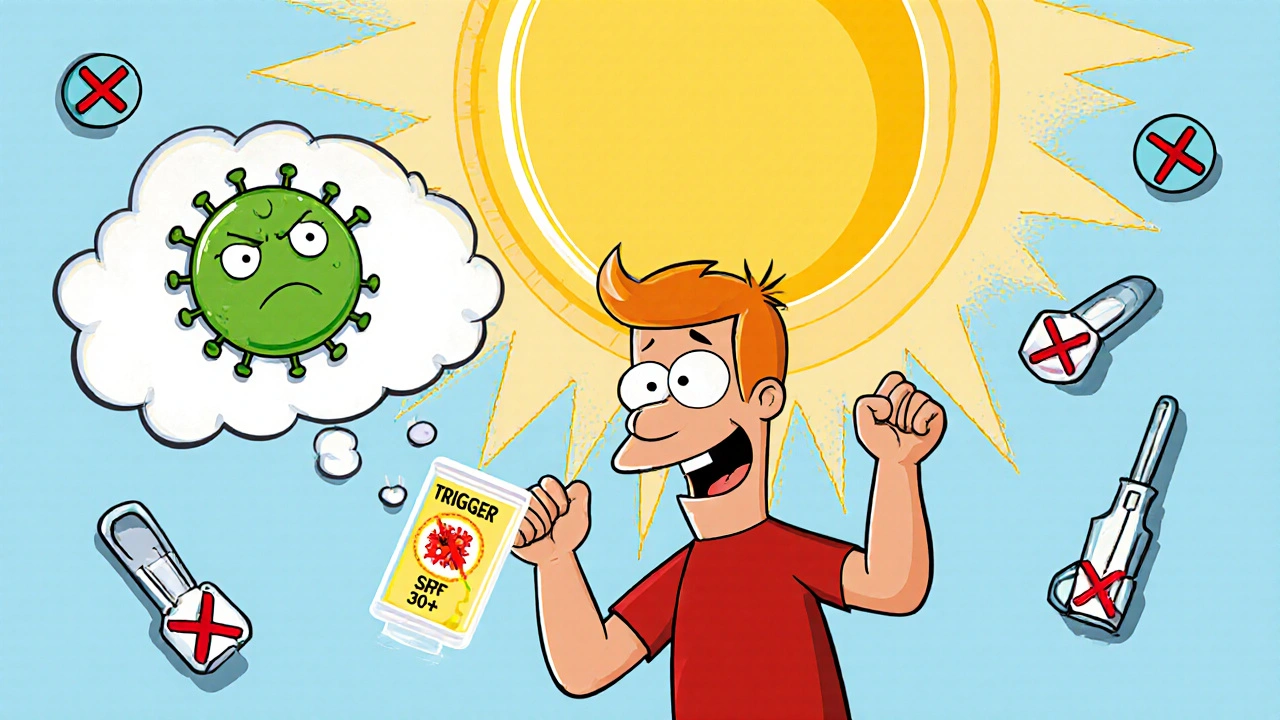Herpes simplex on the skin isn’t just a rash-it’s a recurring reality for millions. Whether it’s the tingling before a cold sore or the painful blisters of genital herpes, the virus doesn’t go away once you have it. It hides in your nerves, waiting for the right moment to come back. The good news? You can take real steps to reduce how often it returns and make outbreaks less severe. This isn’t about miracle cures. It’s about science-backed actions you can start today.
Understanding How Herpes Recurs
Herpes simplex virus (HSV) comes in two types: HSV-1 usually causes cold sores around the mouth, and HSV-2 is more common on the genitals. But both can appear anywhere. After your first outbreak, the virus moves into nerve cells and stays there for life. It doesn’t multiply while it’s hidden-but stress, sunlight, illness, or even a dental procedure can wake it up.
Not everyone gets frequent outbreaks. Some people have one or two a year. Others get them monthly. The frequency depends on your immune system, your triggers, and the type of virus you carry. HSV-2 tends to reactivate more often than HSV-1, especially in the genital area. But even with HSV-1, if you get cold sores more than six times a year, you’re in the group that benefits most from daily preventive treatment.
Antiviral Medications: The Most Effective Prevention Tool
If you have six or more outbreaks a year, daily antiviral medication is the single most effective way to stop recurrences. Three drugs are approved for this: acyclovir, valacyclovir, and famciclovir. Among them, valacyclovir stands out because it’s better absorbed by the body. You take less of it, less often. For example, 500mg once a day of valacyclovir cuts genital herpes outbreaks by 70-80%. For cold sores, 500mg twice daily reduces recurrences by 50-78% after sun exposure.
But here’s the catch: these drugs work best when taken every day. Skipping doses or only taking them when you feel an outbreak coming doesn’t give you the same protection. A 2021 Cochrane review of 38 studies confirmed that daily suppressive therapy is the only method proven to dramatically lower recurrence rates. Episodic treatment-taking pills only during an outbreak-helps shorten healing time but doesn’t stop future outbreaks.
Cost is a real barrier. In the U.S., valacyclovir can run $370 a month without insurance. Many people skip doses because of this. But if you have frequent outbreaks, the cost of missed work, pain, and emotional toll often outweighs the price of the medication. Talk to your doctor about generic options or patient assistance programs. Some pharmacies offer 30-day supplies for under $10 with coupons.
Timing Matters: Episodic Treatment That Actually Works
If you don’t need daily meds, you can still reduce outbreak severity with episodic treatment-but only if you act fast. The moment you feel that familiar tingling, burning, or itching (the prodrome), start your antiviral. Waiting until you see a blister cuts the benefit in half.
The CDC recommends taking 2g of valacyclovir twice in one day, 12 hours apart, as soon as prodrome hits. Studies show this cuts healing time from 5.2 days to 4.3 days. It also reduces how contagious you are during that time. If you wait until the sore is open, the virus has already spread widely. The window for maximum effect is under 1 hour after the first sensation.
Topical creams like acyclovir ointment won’t cut it. Multiple studies, including one from the American Academy of Family Physicians, show they have no real preventive power. Only oral pills work for stopping recurrences or shortening outbreaks.

Triggers You Can Control
Not every outbreak is random. Many are tied to clear triggers-and you can manage most of them.
- Sunlight: UV rays are the #1 trigger for oral herpes. Use SPF 30+ lip balm every day, even in winter. Reapply every 2 hours if you’re outside. A 2022 Healthline survey found 76% of users saw fewer cold sores with consistent sun protection.
- Stress: A Reddit community of over 127,000 HSV-positive people found that 68% link outbreaks to stress. Managing stress through sleep, exercise, or therapy isn’t optional-it’s medical advice.
- Illness: Fevers, colds, or flu can trigger outbreaks. If you’re sick, consider starting antiviral treatment early, even if you don’t have symptoms yet.
- Skin trauma: Dental work, laser treatments, or even aggressive lip exfoliation can wake up the virus. If you’ve had outbreaks before, tell your dentist or aesthetician. Prophylactic valacyclovir before these procedures reduces outbreak risk from 20% to under 12%.
What Doesn’t Work (And Why)
There’s a lot of misinformation out there. Zinc lozenges? Some people swear by them. A 2022 survey showed 63% of users felt outbreaks were less severe with 15-30mg of zinc daily. But no large-scale trial proves it prevents outbreaks. Same with lysine supplements, essential oils, or apple cider vinegar. They might soothe the skin, but they don’t stop the virus.
Topical antivirals? They’re useless for prevention. Only oral meds reach the nerves where HSV hides.
And no, there’s no vaccine yet. Two candidates (GEN-003 and HSV529) showed promise in early trials but failed in 2023 phase III studies. They reduced viral shedding slightly but didn’t stop outbreaks. Don’t believe ads promising a cure. The only proven tools are antivirals and trigger management.
Special Cases: Procedures and Skin Care
If you’re planning a laser treatment, chemical peel, or even a tattoo, you need to plan ahead. The American Society for Dermatologic Surgery now requires clinics to ask about herpes history. If you’ve had outbreaks before, they’ll likely prescribe valacyclovir 500mg twice daily for 10-14 days starting the day before your procedure. Studies show this prevents outbreaks in nearly 100% of cases.
Same goes for dental work. A 2008 study found that taking 2g of valacyclovir one hour before a procedure reduced cold sore risk by 46%. Don’t wait until you’re in the chair to mention it. Schedule a pre-appointment check-in with your doctor.

Living With Herpes: Emotional and Relationship Impact
Herpes isn’t just physical. It affects how you feel about yourself and your relationships. A 2022 survey by the American Sexual Health Association found that people on daily suppressive therapy reported 78% improvement in relationship satisfaction. Why? Because they stopped fearing transmission.
Even with medication, there’s still a small risk of passing it on-about 4-5% in serodiscordant couples. But that drops to less than 1% if you combine daily antivirals with condom use and avoid sex during outbreaks. The key is honesty and planning, not shame.
Support matters. The National Herpes Resource Center and the American Social Health Association offer free counseling and evidence-based info. Their hotlines handled over 14,000 calls in 2022. You’re not alone.
When to See a Doctor
You don’t need to wait for an outbreak to get help. If you’ve had more than six outbreaks in a year, ask about suppressive therapy. If you’re pregnant, have a weakened immune system, or get outbreaks near your eyes, see a specialist immediately. HSV in the eye can cause permanent vision damage.
Also, if your outbreaks don’t improve with antivirals, or if they look different (deep ulcers, bleeding, spreading), get checked. You might have a secondary infection or a rare resistant strain. The FDA approved pritelivir in 2023 for these cases-but it’s only for people with severe immune problems.
What to Expect Long-Term
Herpes won’t disappear. But for most people, outbreaks become less frequent over time. The first year is usually the worst. By year three, many see a 50% drop in recurrences. With daily antivirals, some go years without one.
Future treatments are coming. Long-acting injectable antivirals that last 90 days are in phase II trials. Topical microbicides that block transmission are being tested. But right now, the tools you have-medication, trigger avoidance, and early action-are enough to take control.
You don’t have to live in fear. You don’t have to hide. You just need to know what works-and act on it.
Can herpes simplex be cured?
No, herpes simplex virus cannot be cured. Once you’re infected, the virus stays in your nerve cells for life. But it can be managed. Daily antiviral medication reduces outbreaks by 70-80%, and many people go years without symptoms. The goal isn’t elimination-it’s control.
Is it safe to take antivirals long-term?
Yes, for most people. Acyclovir, valacyclovir, and famciclovir have been used safely for over 30 years. Side effects like headache or nausea are rare and mild. The main concern is kidney function in people with pre-existing kidney disease. Your doctor will check your creatinine clearance before starting long-term therapy. For healthy adults, long-term use is considered safe by the CDC and WHO.
Can I spread herpes if I have no symptoms?
Yes. This is called asymptomatic shedding. Even when you feel fine, the virus can be active on your skin and spread to others. Daily antiviral therapy reduces shedding by 70-90%, but doesn’t eliminate it. Using condoms and avoiding skin-to-skin contact during outbreaks lowers risk further. The key is consistency-not perfection.
Should I tell my partner I have herpes?
Yes. Honest communication builds trust and allows both partners to make informed choices. Most people with herpes are asymptomatic or have mild outbreaks. With daily antivirals and safe practices, transmission risk drops to less than 1% per year. Many couples stay together for decades without transmission. Shame is the biggest barrier-not the virus itself.
Are natural remedies like lysine or tea tree oil effective?
No. There’s no strong scientific evidence that lysine, tea tree oil, zinc, or essential oils prevent or cure herpes outbreaks. Some people report feeling better using them, but that’s likely due to placebo or skin soothing effects. Only FDA-approved antiviral medications have been proven to reduce recurrence and transmission. Relying on unproven remedies can delay effective treatment.
Can herpes affect my eyes or brain?
Yes, rarely. HSV can spread to the eye (herpes keratitis), causing pain, blurred vision, and potentially permanent damage if untreated. It can also cause encephalitis in very rare cases, usually in people with weakened immune systems. If you have eye redness, light sensitivity, or vision changes during an outbreak, see an eye doctor immediately. Never touch your eyes after touching a sore.


Barry Sanders
November 14, 2025 AT 16:46Valacyclovir costs what? In Australia, I get it for $5 a month through the PBS. If you're in the US and paying $370, you're getting scammed. Stop letting Big Pharma bleed you dry.
Chris Ashley
November 15, 2025 AT 23:23bro i took lysine for 3 years and never had a cold sore again. science my ass. i don't need your pills.
kshitij pandey
November 17, 2025 AT 19:16Hey everyone, I’ve had HSV-2 for 12 years now. First year was hell. Now? I take 500mg valacyclovir daily, use SPF lip balm, and sleep well. No outbreaks in 3 years. You got this. It’s not a life sentence-it’s a lifestyle tweak. 💪
Brittany C
November 18, 2025 AT 12:03As a dermatology nurse practitioner, I’ve seen patients self-sabotage with ‘natural remedies’ while ignoring suppressive therapy. The data is unequivocal: oral antivirals are the only evidence-based intervention that reduces both frequency and shedding. Everything else is anecdotal noise.
Sean Evans
November 19, 2025 AT 22:51LOL you people are so naive. You think taking a pill makes you ‘not a burden’? Newsflash: you’re STILL contagious. You’re just better at lying to your partners. 🤡
Anjan Patel
November 20, 2025 AT 21:02My cousin in Delhi got herpes after a tattoo. She tried turmeric paste. She cried. She lost her job. Now she takes valacyclovir. Don’t be her. Take the pill. Save your dignity.
Scarlett Walker
November 21, 2025 AT 06:41I used to hide like it was a crime. Now I tell people upfront. My partner and I laugh about it. We use condoms, I take my pill, and we live. It’s not the end of the world. It’s just part of the story.
Hrudananda Rath
November 21, 2025 AT 20:19It is, indeed, a matter of profound regret that the contemporary medical establishment has, in its infinite wisdom, elevated pharmaceutical intervention to the status of divine revelation-while dismissing the ancient, holistic wisdom of Ayurveda and naturopathy, which have, for millennia, addressed such afflictions with grace, balance, and spiritual alignment.
Brian Bell
November 22, 2025 AT 04:53Just got back from my dermatologist. She prescribed me valacyclovir. Told me to use SPF on my lips every day. I did. No outbreak in 6 months. Life’s good. 🌞
Nathan Hsu
November 23, 2025 AT 18:58Let me be clear: the virus is not curable, but it is manageable. The data is robust. The guidelines are clear. The cost is justified. The stigma? That’s the real epidemic.
Ashley Durance
November 24, 2025 AT 09:42People who say ‘I don’t need meds’ are either lying or dangerously ignorant. This isn’t acne. This is a neurotropic virus that reactivates unpredictably. Your ‘natural remedy’ is a placebo that puts others at risk.
Scott Saleska
November 24, 2025 AT 15:31My doctor told me to take it daily, but I only take it when I feel a tingle. I’ve had one outbreak in two years. Maybe the daily thing is overkill? Just sayin’.
Ryan Anderson
November 25, 2025 AT 02:53Just want to say: if you’re reading this and feeling ashamed-you’re not broken. You’re human. The science is on your side. Take the pill. Use the sunscreen. Tell your partner. You’re doing better than you think.
Eleanora Keene
November 26, 2025 AT 04:56Im so glad this post exists. I had no idea sun was a trigger! I used to get cold sores every summer and thought it was just ‘bad luck’. Now I wear SPF lip balm like its my job. No outbreaks this year! 😊
Joe Goodrow
November 27, 2025 AT 04:11Why are we giving out medical advice on Reddit? This isn’t a public health forum. In America, we trust our doctors-not some blog with Cochrane reviews. If you want real help, go to a clinic. Not a comment section.